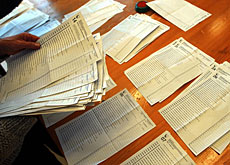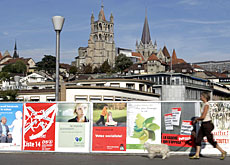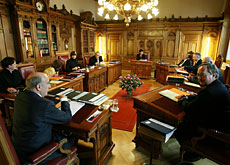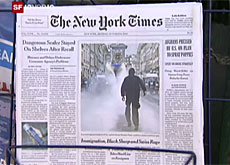Vote counting underway in parliamentary poll

Ballots are being counted in parliamentary elections which are expected to see the rightwing Swiss People's Party consolidate its leading position.
The party’s controversial election campaign, which targeted criminal immigrants, drew fire from many sides and media attention from abroad. While first results are already in, the final breakdown of seats is not expected until Monday.
But the true winners of the election could be the Green Party, which polls predict could soar to about ten per cent from 7.6 per cent in 2003.
Analysts say there is unlikely to be a major change in the make-up of the two-chamber parliament which has been dominated by the four main parties for decades.
These four parties – which include the People’s Party – share power in government, and have done so for more than 50 years.
The People’s Party ran a high-profile campaign on a nationalist, anti-crime and anti-welfare ticket but is likely to come out on top – as it did in the last elections four years ago.
In 2003 it won just under 27 per cent of the vote. The last opinion poll suggested the party would garner 27.3 per cent this time around.
The centre-left Social Democrats and the centre-right Radicals are expected to drop to about 22 and 15 per cent respectively, while the Christian Democrats could gain votes, bringing the two centre-right parties on a par.
Aggressive campaign
Mud-slinging in the run-up to election day increased voter interest, which could result in an above-average turnout of around 50 per cent.
The campaign was dominated by controversy over Justice Minister Christoph Blocher and his People’s Party’s hard-line stance on immigrants and crime.
A People’s Party poster campaign depicting white sheep kicking a black sheep off a Swiss flag drew worldwide media attention and criticism from the United Nations.
Other issues, such as climate change, taxes, social security and unemployment were pushed into the background.
The increasingly aggressive campaign escalated into violence at a rally in the capital, Bern, two weeks ago.
Police clashed with leftwing militants who tried to interrupt a public gathering of the People’s Party and their supporters.
Personalities
For the first time in nearly 50 years the parliamentary elections focused on the personalities of cabinet ministers, in particular Blocher, but also Economics Minister Doris Leuthard and Foreign Minister Micheline Calmy-Rey.
Traditionally ministers act neither as party leaders nor are they directly accountable to their political parties.
It is widely believed to have been the most expensive election campaign in Swiss history with parties spending at least SFr50 million ($42 million).
No detailed figures are available, and Switzerland does not have a transparency law on the financing of political parties.
More than four out of five Swiss, including most of the 111,000 Swiss expatriates who have registered to vote, cast their ballot by mail, according to the federal administration.
There are more than 3,100 candidates running for the 246 seats in the House of Representatives and the Senate for the next four-year term.
The two chambers will choose the new cabinet at a joint meeting in December.
swissinfo
Voters choose the 200 members of the House of Representatives and most members of the 46 Senate for the next four-year term.
The four main parties – People’s Party, Social Democrats, Radicals and Christian Democrats – control more than 75% of the seats in parliament and share the seven cabinet posts.
An alliance of Greens and another leftwing party is the biggest opposition grouping with 14 seats.
Both houses of parliament will meet on December 12 to elect the new cabinet.
People’s Party: 26.7% and 63 seats
Social Democrats: 23.3% and 61 seats
Radical Party: 17.3% and 50 seats
Christian Democrats: 14.4% and 43 seats
Greens: 7.4% and 13 seats
Others: 10.9% and 16 seats
Total: 100% and 246 seats
A total of 44 Swiss expatriates are standing for a seat in the House of Representatives – three times more than in 2003.
According to the Organisation of the Swiss Abroad (OSA), between 30% and 50% of Swiss living abroad who are registered to vote were expected to exercise their right.
Over 110,000 Swiss abroad were registered to vote.

In compliance with the JTI standards
More: SWI swissinfo.ch certified by the Journalism Trust Initiative



You can find an overview of ongoing debates with our journalists here. Please join us!
If you want to start a conversation about a topic raised in this article or want to report factual errors, email us at english@swissinfo.ch.